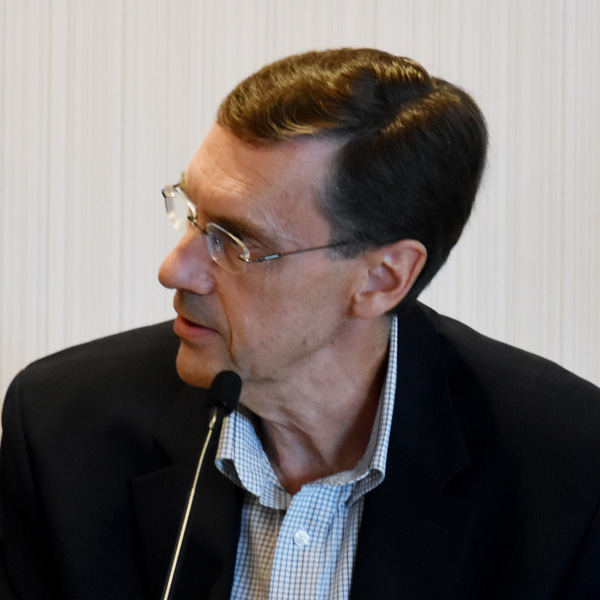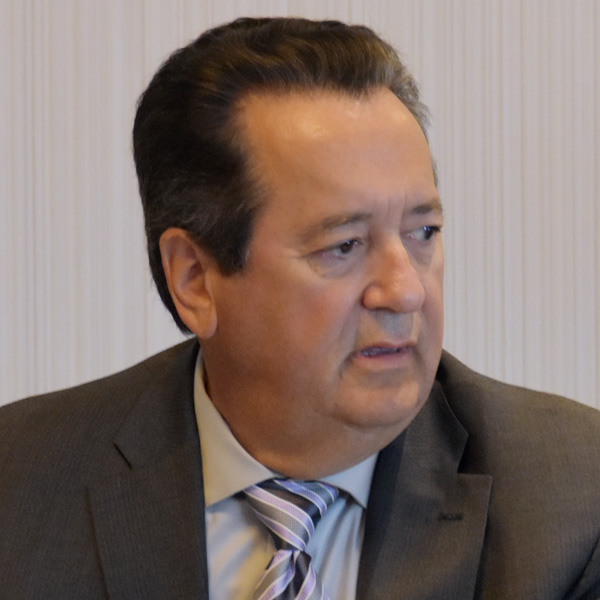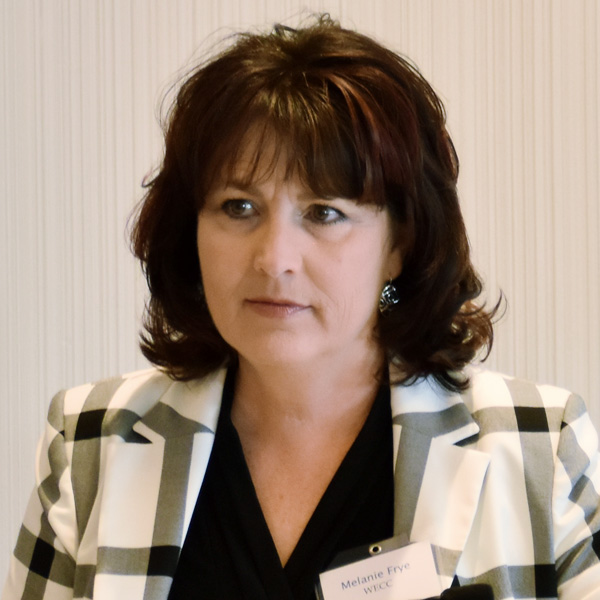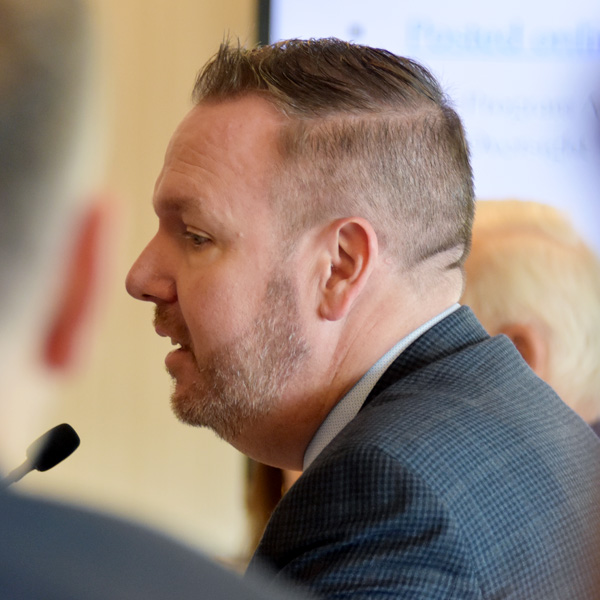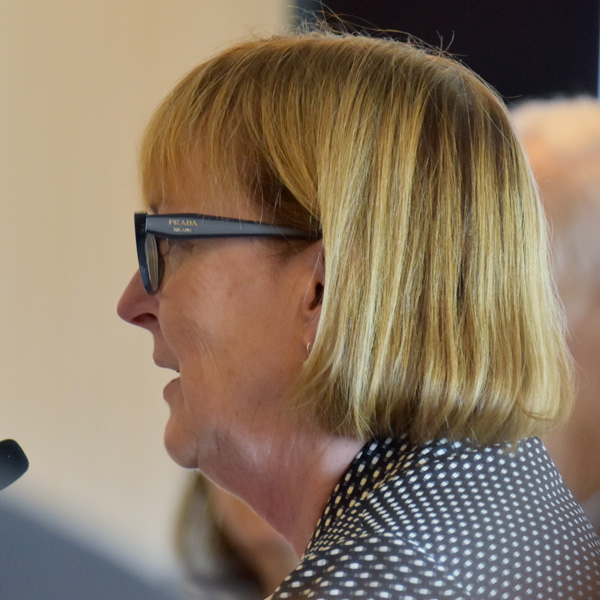
VANCOUVER, British Columbia — Stakeholders got to enjoy sweeping views of Vancouver’s downtown and harbor from a top-floor conference room during WECC’s two-day annual member meeting, which on Thursday featured an election to fill the board’s two top spots. Following is some of what we heard.
‘Great Team’
WECC directors elected current board Vice Chair Ric Campbell to serve as the new chair. Campbell replaces Ian McKay, who finished his three-year term in the top role.
Campbell previously served as chair of the Utah Public Service Commission and director of the Utah Division of Public Utilities. He worked for Shell before joining state government.
Speaking of Campbell, McKay said, “I consider that we’ve been a great team together, and he’s taught me a lot as we’ve gone through the last few years. I’ve valued his guidance and sage advice.”
Campbell returned the compliments, saying McKay “served as chair during a very unprecedented time, because we had to deal with a pandemic and how we were going to operate as a board. He did a fantastic job with that. He’s a man of great integrity.”
The board also elected Director Jim Avery as vice chair. Avery previously worked for San Diego Gas & Electric, most recently as chief development officer.
Talent Competition
Branden Sudduth, WECC vice president of reliability planning and performance analysis, told the board that, while his staff was on track to complete certain transmission studies due later this year, staff turnover represented a “strain” on meeting deadlines.
“We do have new people in place to take over some of the studies that were left behind by my other employees, but that’s my only concern at this point,” Sudduth said.
CEO Melanie Frye added that WECC is struggling to retain staff because of the industry’s attention on transmission, in part because of recent funding from the federal government.
“There is a huge competition for talent in that space. I think it’s now a hot skill,” she said, noting that it added to the broader challenges in finding the right workforce over the next 15 years.
“In that area in particular we’re in an intense competition to attract and retain talent,” Frye said.
But Frye also noted WECC “is fortunate to have some very tenured employees” on staff. With employees now spread across almost 20 different states, WECC is trying to navigate the “new realities and expectations” among workers in the post-pandemic world, she said.
The RE recently brought all its staff together at its Salt Lake City headquarters for “WECC Week.”
“It was a combination of self-awareness training, relationship-building, employee recognition and discussion around the vision and mission of the organization so that we’re all aligned going forward,” Frye said.
More Robust Oversight
Staffing isn’t a problem for WECC’s Oversight department, according to Steve Noess, vice president of reliability and security oversight. Noess, who joined WECC from NERC in April 2022, said his staff has doubled over the past year.
In August, Noess said, Oversight “retooled” how it presents registered entity compliance metrics by providing a quarterly report to the board instead of just making a presentation. The new report is more “robust” with the inclusion of more metrics and will be posted to WECC’s website to make the information available to a wider set of stakeholders.
“We think this also serves this drive to be more transparent because it’s hopefully easier to find and to access and reach a broader audience,” he said.
Noess said his team has grown to include “good analysts and engineers and lawyers” to help develop “a more case management approach” to WECC enforcement responsibilities. The team recently reached an “inversion point,” where it is processing more enforcement cases than it is receiving per month, chipping away at a large backlog.
“We targeted 30% reduction in cases that are two years old and older [in] the last several years,” Noess said. “We’ve come close, but we’ve not quite been able to meet that metric, and I’m happy to say that I’m confident that this year, we’re on track to meet that. Our target was 20% by the end of the third quarter … and 30% by the end of this next quarter.”
Noess also noted that NERC last week proposed new rules that would require owners of smaller grid-connected inverter-based resources (IBRs) to register with the agency, follow its reliability standards and respond to its alerts. (See NERC Seeks Comment on IBR Registration Proposals.)
“We’ve taken a lot of a lot of actions to try to prepare for that already, and we anticipate that should easily add more than 100 new registrations over time,” he said.
WECC Oversight has reorganized its staff to create three different monitoring teams focusing on high-, medium- and low-risk entities, Noess said. Staff already have begun developing plans for the expected rule changes, creating outreach materials targeted at new registrants.
WECC won’t have the capacity to audit all the small entities, “but we definitely, from a holistic perspective, have an obligation to make sure that we are well aware of their capability to address risks,” Noess said.
He said WECC has encountered “two flavors” of questions and concerns from the new IBR registrants.
“One is entities that haven’t had any experience with WECC or reliability whatsoever. So that’s the new population of folks who probably haven’t thought of WECC at all … So we have a very specific kind of targeted way that we want to approach those to set them up for success,” Noess said.
The second flavor consists of existing registered entities that have other assets that will be newly swept into NERC’s administration.
“So, there’s a familiarity with requirements and standards and obligations, but they have additional assets that they’ll then have to register for this new registration. And I think they’re understandably asking about what timelines will look like,” Noess said. “And so, this is a case where we should stay close to that, because there’s a process in place once the registration changes to do the modifications to meet the standards.”
Policy Risk
“There is a push for more market development in the West, perhaps leading to an RTO, and that occupies a lot of the time in our [Committee on Regional Electric Power Cooperation-Western Interconnection Regional Advisory Body] meetings, so I like to make sure that we don’t lose sight of the reliability discussion and certainly appreciate WECC’s partnership on that,” Mary Throne, chair of both the Wyoming Public Service Commission and WIRAB, told the board.
Throne said one the most interesting parts of NERC’s 2023 ERO Reliability Risk Priorities Report, released last month, was the addition of public policy to the list of grid risks. (See ERO Adds Energy Policy to Risk Priorities List.) She cited EPA’s recent proposed new rules for reducing greenhouse gas emissions from power plants as an example of the need for better coordination among regulatory agencies.
“In the preamble to the EPA regs, EPA commented that it had coordinated with FERC, but there really wasn’t anything in the preamble to support that statement,” Throne said.
After acknowledging Wyoming’s role as the nation’s leading producer of coal and an exporter of electricity, Throne said the state “did not feel like the EPA really considered the reliability risk” of its proposed regulations. “I think I might even use the word ‘naïve,’” she said.
Director Richard Woodward asked Throne how WIRAB and WECC can address the issue of energy policy risk.
“I think a communication strategy that puts all of this in terms that people can understand, identifying the risks without creating hysteria,” Throne said. “I don’t want to see the reliability discussion being politicized too much, but just a pragmatic discussion with reason, facts. And I think it’s important that WECC remains … a neutral source of technical information, so that policy people have good advice.”
